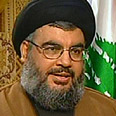
Hizbullah's Hassan Nasrallah (archive photo)
צילום: איי אף פי
Nasrallah's quandary
Hizbullah leader may provoke Israel but won't be quick to renew fighting
The people most horrified by Minister Binyamin Ben-Eliezer's latest declaration regarding "another round of fighting between Israel and Hizbullah coming soon" were the hundreds of thousands of Shiite southern Lebanon residents.
They, the victims of the last war, residents of the cities, towns, and villages around the Shiite Jabal Amel region, were stunned by the news, which caught them while they re-establish their homes and fields.
The southern Shiite followers of Sheikh Hassan Nasrallah have been engaged in, since last August, quiet yet incisive dialogue with the Hizbullah leadership over the difficult results of the latest war, which left many of them with nothing.
If there's one thing that frightens them more than anything, it is the fear of another round of fighting in the near future. For months now they've been imploring Nasrallah and his people, quietly and secretly "so that the Israeli enemy doesn't hear it," to refrain from rushing into another military adventure.
"Now isn't the time, let us rebuild our lives." Yet suddenly, they hear the sounds of war coming from the Israeli side, and from a senior minister no less.
Here are some figures regarding the war's results on the Lebanese side: The non-governmental American organization Anera, which conducted a serious, in-depth poll regarding the damages of Nasrallah's "divine victory" counted more than 1,000 Lebanese dead and about 30,000 damaged homes that are slowly being rebuilt. About 92 bridges were also destroyed, but only 68 have been renovated.
The organization also reported that about a million bombs were left in residential areas. Their removal and dismantlement is terribly slow (this delay has led to 20 deaths and hundreds of injured so far).
The institutions being renovated by Arab donor countries include about 160 schools, dozens of hospitals, clinics, and other institutions. In southern Lebanon, the disaster's epicenter, the renovation work is hampered by foot-dragging, either because of budgetary constraints or contempt shown by the central government to area residents.
Nasrallah faces harsh criticism
The town of Bint Jbeil, for example, is ruined and still in pain. About 40 percent of its homes were completely destroyed, and the entire business and commercial fabric of the Shiite capital, where Nasrallah delivered his famous "spider web" speech, has ceased its activity in essence since the fighting began.
Hizbullah leaders in town began rebuilding it only after they received an unequivocal confirmation from top officials that there are no "interruptions" on the horizon. That is, Hizbullah will refrain from initiating provocative actions that may meet an Israeli response that would hinder the town's renovation effort.
At his hideout in a Beirut bunker, Nasrallah has been recently subjected to harsh criticism over his responsibility for the Lebanese disaster. He apologizes here and there, admits his mistake, and even expresses regret.
The Christians, Sunnis, and Druze target him mercilessly, while internal Shiite opposition led by Sheikh Subhi Tufaili is attacking him from another direction. Meanwhile, Lebanese clerics from all ethnicities are warning him not to repeat his summertime mistake. Yet Nasrallah, Lebanon's new hero, has to leverage the "divine victory" over Israel after all.
One theater where Nasrallah is attempting to translate his success to substantive achievements is Lebanese politics, where he aspires to boost the number of Shiite ministers in the government – without much success.
The second theater is the military one, where he's facing a catch-22 situation: On the one hand, his Iranian patron and Syrian arms supplier are interested in provocations, because quiet is bad for them; on the other hand, the Lebanese public is unwilling and unprepared for another war adventure, certainly not within such short period of time.
Therefore, it appears that Nasrallah's tactic in the near future would be to place a strong emphasis on the internal political sphere, alongside low-intensity activity against the IDF: Displaying Hizbullah's presence on the border, provoking Israeli troops, placing explosive device ambushes, firing on an outpost or patrol, attacking an Israel community here and there and particularly, exploiting the presence of the Lebanese army and UNIFIL forces in the south in a bid to create provocations and incidents that could get Israel mixed up with the UN and the countries that sent troops to the area.
Nasrallah won't be quick to enter a new round of fighting; he will stretch the rope as much as he can, while being careful not to cut it.
The writer commanded the Tyre and Bint Jbeil region in the IDF's Lebanon Liaison Unit and is currently a researcher at the Samuel Neaman Institute for Advanced Studies in Science and Technology










